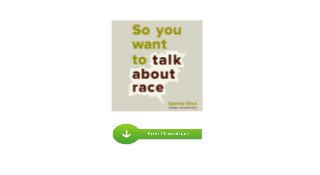

People can be privileged for many reasons-such as being able-bodied, male, or neurotypical. Oluo also thinks that privilege is intersectional. That same assumption keeps dark-skinned women away from opportunity, leaving more opportunities available for others. Oluo says that if she finds it easier to get a job because she’s a light-skinned black woman, she’s benefitting from a racist assumption among her employers that black women are less intelligent than white women.

She argues that privilege is having a set of advantages in society because other people don’t. She also advises them not to demand an education about race from people of color or to police their tone of voice, because this is effectively asking for emotional labor from people who are already at a disadvantage.įrom here, Oluo discusses privilege and intersectionality. To mitigate this, she advises privileged people to avoid assuming that they know what it’s like be black just because they know black people.

Oluo acknowledges that many white people, including her own mother, often unintentionally say insensitive or hurtful things during conversations about race. She equates changing an individual’s mind to treating the nausea that cancer causes rather than treating the cancer-the system that creates racists-itself. Oluo argues that fighting racism isn’t about changing individual people’s minds-it’s about changing a system (which she describes as a “ machine”) that encourages and reinforces racist behavior. Treating one won’t cure the other, so both need to be addressed. society: classism is one kind of cancer, and racism is another kind of cancer. Oluo also says that oppression is like cancer in U.S. society, meaning it functions to keep that cycle-of taking from people of color to benefit rich, white men-in place. She thinks that the principle “ you will get more because other people get less” still drives U.S. society to help them amass wealth and power by stealing land and labor from people of color. Oluo thinks that those in power set up U.S.

society was designed under the principle of racial oppression, beginning with the genocide of Native Americans and the enslavement of black people. Oluo thinks that people who suggest that social justice efforts should focus on class (rather than race) are mistaken. These conversations, she says, are inherently uncomfortable-both for privileged people and oppressed people-but she encourages people to embrace their discomfort for the ultimate goal of reducing racial inequality. society, so she’s writing this book to help people have more productive conversations about racism. She thinks that racism is a pervasive problem in U.S. Author Ijeoma Oluo begins So You Want to Talk about Race by saying that her experiences as a black woman in U.S.


 0 kommentar(er)
0 kommentar(er)
